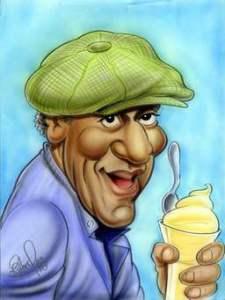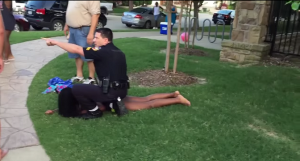 By Alan Bean
By Alan Bean
I don’t know how Sandra Bland died.
It’s hard to believe that a young woman anticipating a dream job at her Alma mater would hang herself in a prison cell.
Strong evidence has emerged that Ms. Bland had evidenced what psychologists call “suicidal ideation” in the past, but wouldn’t Bland have been determined to see justice prevail in this instance? Suicide was the way of passive acquiescence, the complete opposite of the mental state Sandra exhibited in her confrontation with trooper Encinia.
It’s equally hard to believe that anyone would hate her enough to take her life and, thus far, there is no direct evidence suggesting foul play. That could change, but for the moment the facts are too fuzzy to justify confident conclusions.
The temptation to speculate is strong with us, but we should all admit that we have more questions than answers.
But we do know enough to ask why Sandra Bland was arrested in the first place. If you have been following this story, you know that the young woman from Illinois was in no mood to be messed with when state trooper Brian Encinia pulled her over. Bland believed she was the victim of racial profiling and entrapment. Her answers to the trooper’s questions were curt and defensive.
In the course of a prolonged verbal exchange, Brian Encinia admitted that he had initially intended to issue a warning and let the minor infraction pass. But the trooper didn’t like Bland’s attitude so he intentionally escalated the tension by asking her to extinguish her cigarette.
And that’s when everything went south.
Here in the land of the free, we are allowed to smoke cigarettes in our own vehicles. Encinia might not be comfortable with this level of freedom, but it wasn’t his call.
When Bland challenged his right to issue this demand, Encinia immediately ordered her to leave the vehicle. He didn’t tell her why he wanted her feet on the pavement; he simply issued another comply-or-die order.
As the situation escalated, Encinia was so insistent that Bland demonstrate due deference that he unholstered his taser and threatened to use it.
The goal was to establish dominance. This had nothing to do with police work or maintaining public safety. Encinia’s superiors have stated uncategorically that the trooper departed from the established protocols of his profession and no seasoned police officer would defend his behavior.
And yet we are hearing the usual “if she had complied with the officer’s demands nothing would have happened” comments on social media. A healthy percentage of the population believes that police officers can be as nasty as they wanna be and it is our responsibility, as docile citizens, to trust and obey.
Trust and obey
for there’s no other way
to be happy in a police state
than to trust and obey.
The authoritarian impulse is fundamentally undemocratic, but it too is strong among us.
It is commonly assumed that certain people live above the law: police officers and soldiers (because our safety depends on their efforts); entertainers and athletes (because we take our entertainment very seriously); and captains of industry (because we need the jobs their entrepreneurial heroics create).
Until the early 19th century, a subset of the population (the ordained clergy) was not subject to the civil law. Under an odd division of judicial labor, monks, priests and bishops could claim their “benefit of clergy” and have their cases tried before far more lenient ecclesiastical courts.
I found this paragraph from the Wikipedia article on benefit of clergy particularly significant (and if you still think Wikipedia isn’t a source of scholarship you haven’t been keeping up).
In the ecclesiastical courts, the most common form of trial was by compurgation. If the defendant swore an oath to his own innocence and found twelve compurgators to swear likewise to their belief that the accused was innocent, he was acquitted. A person convicted by an ecclesiastical court could be defrocked and returned to the secular authorities for punishment; but the English ecclesiastical courts became increasingly lenient, and, by the 15th century, most convictions in these courts led to a sentence of penance.
Compurgation is still with us (even though the word now the word itself is unknown to spellcheck). If a police officer or a soldier charged with the abuse of authority can summon the support of a dozen opinion leaders chances are he will escape the consequences of his actions. This principle even applies to vigilante cops like the increasingly bizarre George Zimmerman.
 The evidence that Bill Cosby is a serial rapist has long been strong, and gets stronger with each passing day. But, unlike Sandra Bland, Cosby is unlikely to see the inside of a prison cell. That’s because “The Cos” has a penchant for telling white America what it wants to hear about Black America and the eclipse of racism. Having supported their great black hope for so long, white folks ignore the long string of victims the Pudding Pop Man has left in his wake. The modern version of benefit of clergy may not do much for actual preachers, but it works overtime for men like Brian Encinia and Bill Cosby.
The evidence that Bill Cosby is a serial rapist has long been strong, and gets stronger with each passing day. But, unlike Sandra Bland, Cosby is unlikely to see the inside of a prison cell. That’s because “The Cos” has a penchant for telling white America what it wants to hear about Black America and the eclipse of racism. Having supported their great black hope for so long, white folks ignore the long string of victims the Pudding Pop Man has left in his wake. The modern version of benefit of clergy may not do much for actual preachers, but it works overtime for men like Brian Encinia and Bill Cosby.
And what are we to make of Donald Trump’s meteoric rise to the top of the Republican presidential pack? As I write, it remains to be seen whether Trump will survive his mean-spirited (and grotesque) attack on John McCain who, whatever you may think of his politics, showed rare heroism as a prisoner of war in Vietnam. But Trump’s ugly assault on Mexican Americans and the sophomoric insults he hurls at his political competition only endear the man to his passionate admirers.
It’s the benefit of clergy, American-style. For those who divide the world into “makers” and “takers”, Donald Trump is the epitome of makerhood, a man who transcends the usual rules of social etiquette. If you are worth as much as The Donald, you don’t have to be good, or merciful, or kind, or humble or even rational. Traditional virtues are for losers. If you win, you make your own morality. Right?
Tough guy cops like Brian Encinia can abuse American citizens (so long as they are bad-ass Blacks) and trained assassins like Chris Kyle are free to roam from one bar fight to another without reckoning with the legal consequences or drawing the censure of macho America. It’s that willingness to bad guy ass that makes us safe. Right?
This valorizing of macho posturing doesn’t translate into concern for military veterans struggling with an under-funded VA system, nor does it inspire the slightest concern for the astronomical rates of suicide and PTSD we have seen within the military community. As Mr. Trump suggests, the real winners made it out sound of mind and body. Tough guys don’t get PTSD. Right?
These days, benefit of clergy only works for winners.
Brian Encinia, the man who transformed a questionable traffic stop into a funeral, will almost certainly lose his job over this latest example of blatant police misconduct and racial injustice. The episode was captured on film. It looks worse every time you look at it.
 The same was true of Eric Casebolt, the temporarily insane officer in McKinney, Texas who repeatedly flung a scantily clad, one hundred pound, teenage girl to the sidewalk. Again, the episode was caught on film.
The same was true of Eric Casebolt, the temporarily insane officer in McKinney, Texas who repeatedly flung a scantily clad, one hundred pound, teenage girl to the sidewalk. Again, the episode was caught on film.
And that’s the way it works. If there are no cameras present, these episodes devolve into he-said-she-said narratives and benefit of clergy reigns. If the misconduct is captured by the camera, all bets are off.
And yet, even after rogue cops like Casebolt and Encinia step down in disgrace, they will remain culture war heroes in the minds of many.
 Donald Trump will eventually nosedive in the polls; most likely sooner than later; but his brief moment of glory proves that, in our America, some of us live above the law, above the rules, above the moral consensus. So long as their enemies are our enemies they can do no wrong. Right?
Donald Trump will eventually nosedive in the polls; most likely sooner than later; but his brief moment of glory proves that, in our America, some of us live above the law, above the rules, above the moral consensus. So long as their enemies are our enemies they can do no wrong. Right?
